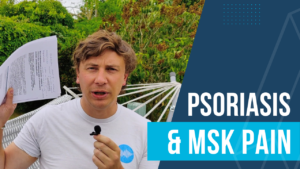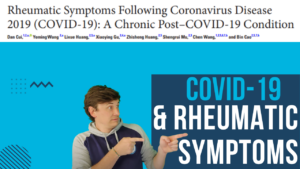Welcome back Rheumatology fans, something a bit different but to a degree Rheumatology related so bear with it. Today (as I write this) I completed the Faculty of Sports and Exercise Medicine MSK Diploma exam, I wanted to share my experience! Maybe you are thinking of doing it or haven’t heard about it yet! I have no affiliation with the diploma other than the fact that I took the exams today so hopefully no bias.
I am going to start with some functional parts of the exams, then move on to the experience.
Why did I want to do the exam?
I am not one, particularly for accolades or official titles. I don’t think they are worth as much as maybe some others do and in Physiotherapy, for example, they don’t get you very much. On the flip side, I do like to show off that I can do things and know things which other than an MSc or post-grad study is again a bit thin on the ground. This Diploma seems accessible both from a time and financial perspective, with a solid credibility and good reports from some who completed it in the last intake (Felicity Thow and Andrew Cuff). I dragged £250 out from somewhere and committed to doing the exam!
Functional Parts Of The Exam
Ok, so should you decide to do the exam here are some things to note.
There are revision days you can attend and a syllabus. I would advise checking these out. I for various reasons didn’t and I regret that…
The exam is run with a “proctor” which means someone is watching and listening to you while you do the exam paper. Prepping for this is quite involved and when they say you should do it at least 48 hours before the exam, you should heed that advice. You need to download a chrome extension and run checks on your computer, download a phone app and set up your room so that there are no papers or books, etc that could be used to have notes on or look stuff up in. You also cannot be disturbed. I ended up on my son’s bed to do the exam as I didn’t afford the time to tidy my office sufficiently. You use the phone app to show the proctor around the room (extensively) and then use it to watch you do the exam as well. I heard a few weird and wonderful ways of propping up the phone (i have a tripod) and it needs to be plugged in for the duration or it will churn through your battery life. The rest is straightforward, the proctor leaves you to it unless I assume, they think you are cheating.
There were 2 papers, each with a 90 min time limit to answer 90 multiple-choice questions. It took me just over 65 minutes to complete each paper including going back over the questions a second time so do not concern yourself with running out of time. You are presented with 2-3 lines of information and then a question such as What are the most reasonable next step and 5 possible answers of which you can select one. You can flag questions for later which I realized halfway through the second paper and a really helpful little function where you can strike through an answer as if eliminating it from your reasoning process.
Once you finish, you can choose to review your answers (flagged ones highlighted) or hit submit and can’t change your answers from then on.
All in all, for someone well versed in tech processes this was all very easy and self-explanatory. I wouldn’t be surprised if some people who struggle with technology might have more difficulty. Set aside time the day before the exam to practice the setup of the room!
Experience
The main thing that stands out for me is the style of questioning. I suspect this is a lot to do with being a Physio stepping into the world of medicine. 2-3 lines of information and then deciding which imaging modality is best suited to the situation or what treatment options are optimal was initially really off-putting. My instinct was to constantly want more information. After a while, I got into the stride of it and you get into a bit of a rhythm, occasionally being thrown off by curveball questions… back to that later. The answers seem so definitive, with so little room for the grey of clinical practice.
One thing I found a real challenge was questioned where there seem to be multiple correct answers and yet you can only select one. Of course, in Physio, we love the “IT DEPENDS” answer which appeared on precisely none of the answer options. I don’t have sight of the marking scheme and maybe you can select one of these answers and be correct, that remains to be seen. The other outcome here of course is that I thought there were multiple correct answers when there was only one! Maybe this reflection will take on a whole different flavor if I have spectacularly failed. It was interesting to catch up with a few others who took the exam yesterday and it seems we did not agree on answers to a lot of questions, not because one or the other thought they were definitively correct but because of the small margins of reasoning separating different answers.
I am a rheumatology geek as you probably well know, so I was delighted to see lots of questions on Rheumatology, especially gout, I am genuinely hoping this carries me through the rest of the exam. There was a lot more paediatrics than I had expected and I felt my lack of knowledge in this area, especially around ages of development and epidemiology of issues found in children. Some of these questions took a wild guess. This is where checking the syllabus with plenty of time and attending revision sessions would have been EXTREMELY useful.
There were some really interesting curve ballcurveball questions, part of me thinks I overthought these and the rest of me thinks that’s it an excuse for lack of knowledge, again that remains to be seen. Safeguarding, red flags, and social situations all came up forming part of the question and seemingly informing your answer. A real change of pace from previous clinical discussions I have had made me think very hard about what I would do if confronted with the situation. I do suspect, if I had ever spent some time in a Paeds environment I would have found this much easier to tackle.
Overall
I am sure you are reading wanting to know, do I recommend taking this exam? I would answer a resounding YES. No single thing in recent times has exposed my weaknesses as a clinician (one who prides himself on complex differential diagnosis by the way) then this exam did. I will be genuinely proud if I do pass, it was difficult without needing to use highly obscure or niche questions and answers and a really good test of your reasoning processes. I am genuinely fascinated by the result I will have achieved and I haven’t felt this for a long time in my career.
So, yes, I would recommend entering the next intake of this exam. If you do here are my tips:
- Read all the info you are sent immediately and PLAN AHEAD
- Attend the revision sessions and read the syllabus (I didn’t. Idiot)
- Prepare to be challenged and maybe enjoy the process
Let me know if you took the exam and what you thought, I will follow this through and publish my result when it comes out… watch this space
Would you like these blogs directly to your email inbox? I now have a weekly newsletter! SUBSCRIBE HERE


